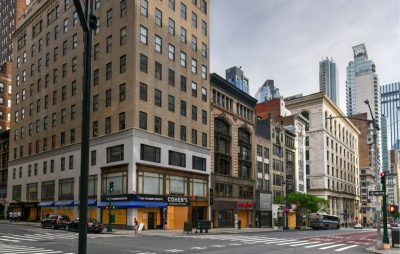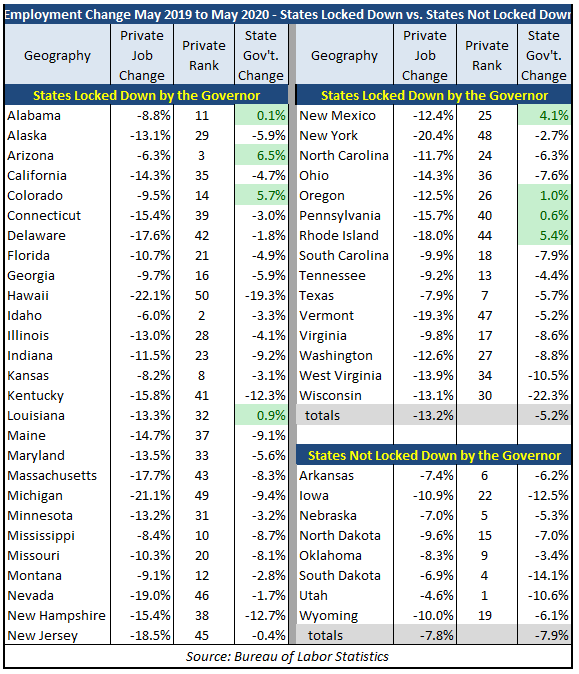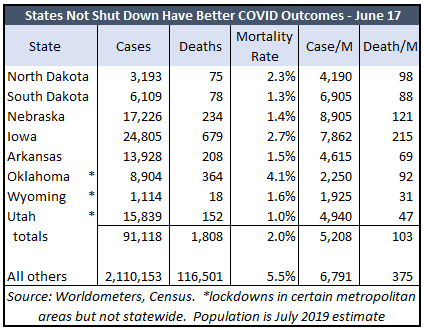Again, What Were the Benefits of Locking Down?

The school closures, stay home orders, shuttering of businesses, banning of elective surgeries, closure of physical entertainment events, blocked flights, and sudden imposition of a central plan – it all happened suddenly from mid-March in the course of only a few days, and to enormous shock on the part of people who had previously taken their freedom and rights for granted.
Despite enormous pressure from Washington, eight states did not lock down or used a very light touch: South Dakota, North Dakota, South Carolina, Wyoming, Utah, Arkansas, Iowa, and Nebraska.
After 100 days, we are in a position for some preliminary analysis of the performance of locked down states versus those that did not lock down. AIER has already published the evidence that lockdown states had higher rates of unemployment.
The Sentinel, a nonprofit news source of the Kansas Policy Institute, confirms our research by reporting the following data: locked down states have overall a 13.2% unemployment rate, while open states have a 7.8% unemployment rate.

But perhaps this better economic performance came at the expense of health?
In terms of health, locked down states have nearly four times the death rate from COVID-19.

The results do not prove that staying open necessarily caused the good outcomes, but should certainly lead us to question the notion that “lockdowns are necessary or else we all are going to die.”
To be sure, many mitigating factors may exist. Open states may have had fewer long-term health facilities housing people with low life expectacies; in every state, these account for roughly half of all deaths from COVID-19. In fact, “deaths among a narrow 1.7% group of the population are greater than deaths from the other 98.3%.”
Population density between the states also varies and that could have been an explanatory variable. The open states also lacked governors who mandated that nursing homes accept active COVID-patients. Earlier this month, we published some more detailed research “Unemployment Far Worse in Lockdown States, Data Show” by economist Abigail Devereux who found similar results.
A routine trope in the media is that people who oppose lockdowns are pushing freedom and wealth over safety and health. But as we can see from this clean examination of the results, the open states experienced less economic pain and less pain from the disease itself.
We are seeing desperate attempts by politicians, public health officials, and media commentators somehow to make sense of why the United States pursued the course it did with the closures, stay-home orders, travel bans, and near-universal quarantine, in violation of every principle that America has celebrated in its civic culture.
With the evidence coming in that the lockdowns were neither economically nor medically effective, it is going to be increasingly difficult for lockdown partisans to marshal the evidence to convince the public that isolating people, destroying businesses, and destroying social institutions was worth it.
*
Note to readers: please click the share buttons above or below. Forward this article to your email lists. Crosspost on your blog site, internet forums. etc.
Edward Peter Stringham is President of the American Institute for Economic Research, Davis Professor of Economic Organizations and Innovation at Trinity College, and Editor of the Journal of Private Enterprise.
Featured image is from AIER

